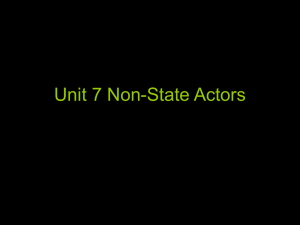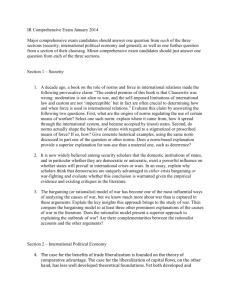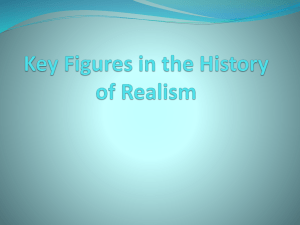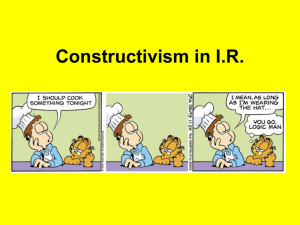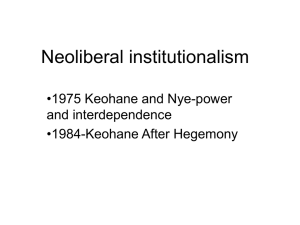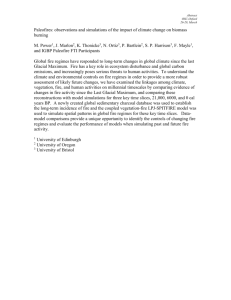Lecture_6
advertisement
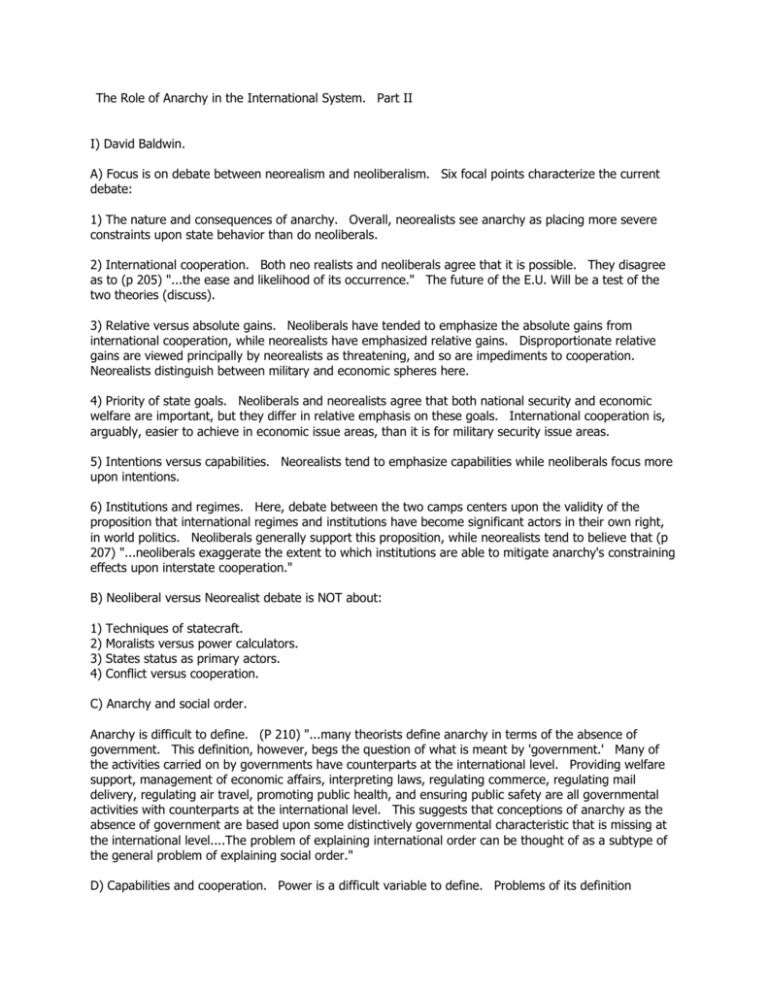
The Role of Anarchy in the International System. Part II I) David Baldwin. A) Focus is on debate between neorealism and neoliberalism. Six focal points characterize the current debate: 1) The nature and consequences of anarchy. Overall, neorealists see anarchy as placing more severe constraints upon state behavior than do neoliberals. 2) International cooperation. Both neo realists and neoliberals agree that it is possible. They disagree as to (p 205) "...the ease and likelihood of its occurrence." The future of the E.U. Will be a test of the two theories (discuss). 3) Relative versus absolute gains. Neoliberals have tended to emphasize the absolute gains from international cooperation, while neorealists have emphasized relative gains. Disproportionate relative gains are viewed principally by neorealists as threatening, and so are impediments to cooperation. Neorealists distinguish between military and economic spheres here. 4) Priority of state goals. Neoliberals and neorealists agree that both national security and economic welfare are important, but they differ in relative emphasis on these goals. International cooperation is, arguably, easier to achieve in economic issue areas, than it is for military security issue areas. 5) Intentions versus capabilities. Neorealists tend to emphasize capabilities while neoliberals focus more upon intentions. 6) Institutions and regimes. Here, debate between the two camps centers upon the validity of the proposition that international regimes and institutions have become significant actors in their own right, in world politics. Neoliberals generally support this proposition, while neorealists tend to believe that (p 207) "...neoliberals exaggerate the extent to which institutions are able to mitigate anarchy's constraining effects upon interstate cooperation." B) Neoliberal versus Neorealist debate is NOT about: 1) 2) 3) 4) Techniques of statecraft. Moralists versus power calculators. States status as primary actors. Conflict versus cooperation. C) Anarchy and social order. Anarchy is difficult to define. (P 210) "...many theorists define anarchy in terms of the absence of government. This definition, however, begs the question of what is meant by 'government.' Many of the activities carried on by governments have counterparts at the international level. Providing welfare support, management of economic affairs, interpreting laws, regulating commerce, regulating mail delivery, regulating air travel, promoting public health, and ensuring public safety are all governmental activities with counterparts at the international level. This suggests that conceptions of anarchy as the absence of government are based upon some distinctively governmental characteristic that is missing at the international level....The problem of explaining international order can be thought of as a subtype of the general problem of explaining social order." D) Capabilities and cooperation. Power is a difficult variable to define. Problems of its definition include: 1) Scope and domain. (P 211) "...The most common conception of power in social science treats power relations as a type of causal relationship in which the power wielder affects the attitudes, behavior, beliefs, or propensity to act of another actor....Anyone who employs a causal conception of power MUST specify domain and scope." Waltz argues that ( P 211) "...the capabilities of states can be ranked according to 'how they score on all of the following items: size if population and territory, resource endowment, economic capability, military strength, political stability, and competence." Other researchers emphasize that (P 212) "...the capabilities of nation-states could not be estimated outside the context of a set of assumptions about who was trying to get whom to do what." 2) The zero-sum problem. (P212) "The question, of course, is whether [a] monolithic measure of power is useful. A multi-dimensional concept of power, which allows for variations in scope, weight, and/or domain, makes monolithic measures problematic." 3) Fungibility. Defined (P213) as "...the ease with which capabilities in one issue-area can be used in other issue-areas." II) Achieving Cooperation Under Anarchy: Strategies and Institutions. Robert Axelrod & Robert O. Keohane. (P 217) "Achieving cooperation is difficult in world politics. There is no common government to enforce rules, and by the standards of domestic society, international institutions are weak. Cheating and deception are endemic; yet cooperation is sometimes attained. World politics is NOT a homogenous state of war: cooperation varies among issues and over time." A) Definitions of key concepts: 1) Anarchy. Refers to the lack of a global government. It does not deny that a fragmented global society exists. Thus, anarchy is seen a remaining constant while the degree to which international civil society exists, as well as its structural configuration vary with time. 2) Cooperation is not equivalent with harmony as there is not an identity of interests. Cooperation, thus, occurs in situations containing a mixture of conflicting and complementary interests. It takes place when actors adjust their behavior to the actual, or anticipated, preferences of others." B) The effect of structure on cooperation. Three structural dimensions affect the propensity of actors to cooperate: 1) Mutuality of interest. The payoff structure of a 'game' [note that this article is predicated upon game theory] affects the level of cooperation. (P 219 "The payoff structure that determines mutuality of interest is not based simply upon objective factors, but is grounded upon the actors' perceptions of their own interests. Perceptions define interests" [A change in payoffs affects outcome for prisoner's dilemma and etc.]. Beliefs NOT realities govern conduct (think back to Wendt in part 1). Note that (P 220) "...political-economic and military security issues can be analyzed within the same analytic framework. Admittedly, economic issues seem to exhibit less conflictual payoff structures than do those of military security." 2) The shadow of the future. (P 220) "In the prisoner's dilemma [DC>CC>DD>CD] concern about the future helps to promote cooperation. The more future payoffs are valued relative to current payoffs, the less the incentive to defect today--since the other side is likely to retaliate tomorrow." Several factors contribute to the relationship between the shadow of the future and cooperation: a) long time horizons b) regularity of stakes c) reliability of information about the other's intentions d) quick feedback about changes in the other's actions (P 222) "The length of the shadow of the future, like the character of payoff structures, is not necessarily dictated but the objective attributes of a situation. On the contrary, as we have just seen, expectations are important. International institutions may therefore be significant, since institutions embody and affect actors expectations. Thus, institutions can alter the extent to which governments expect their present actions to affect the behavior of others on future issues. The principles and rules of international regimes make governments concerned about precedents, increasing the likelihood that they will attempt to punish defectors. In this way international regimes help to link the future with the present....This is also true of arms control agreements....By sanctioning retaliation for those who violate rules, regimes create expectations that a given violation will be treated not as an isolated case, but as one in a series of interrelated actions." 3) Number of actors. (P 222) "The ability of governments to cooperate in a mixed-motive game is affected not only by the payoff structure, but also by the number of players in the game and how their relationships are structured...Reciprocity can be an effective strategy to induce cooperation among self-interested players..." Effective reciprocity requires three conditions: a) players can identify defectors b) players can focus retaliation upon defectors c) There are sufficient long-run incentives to punish defectors. These conditions are harder to meet if there are many actors. This is known of as the sanctioning problem. (P 233) "When sanctioning problems are severe, cooperation is in danger of collapsing. One way to bolster it is to restructure the situation so that sanctioning becomes more feasible...[including] construct[ing] international regimes to provide standards against which actions can be measured, and to assign responsibility for applying sanctions. Regimes provide information about actors compliance; they facilitate the development and maintenance of reputations, they can be incorporated into actors rules of thumb for responding to others; actions; and they may even apportion responsibility for decentralized enforcement of rules." C) The context of interaction. Context is crucial to whether or not cooperation without central guidance occurs. Shared, implicit, norms can be a factor. Institutions can be another, as discussed above, they can lengthen the 'shadow of the future.' They may also allow for large N-person games to be broken down into several games with smaller numbers of actors. Multi-level games, where distinct, different games affect one another so that heir outcomes become mutually contingent, offer a game theoretical way of looking at interaction context. Three situations are relevant: 1) Multi-level Games. a) Issue-linkage. Most issues are linked to one another. Thus games being played on different 'chessboards' affect one another. (P 224) "Issue-linkage in this sense involves attempts to gain additional bargaining leverage by making one's own behavior on a given issue contingent on others' actions towards other issues." b) International relations and domestic politics. Linkages exist between international relations and domestic politics. (arms control etc). c) Compatibility and incompatibilities among games. (P 226) "Many different games take place in world politics, involving different, but overlapping sets of actors. Sometimes the existence of more than one game makes it easier to attain cooperation, but related games may also create difficulties for one another. That is, games in world politics can be compatible or incompatible, with one another." 2) Reciprocity as a strategy in multi-level games. Reciprocity is often effective in promoting cooperation. But it is not a 'perfect' strategy. Problems include: a) 'echo effect' can perpetuate conflict. b) deadlock is possible even where shared interests exist. c) (P 227) "When several actors negotiate separately and sequentially over issues that are substantively interdependent, subsequent bargains may call previous agreements into question by altering the value of concessions that have been made." D) Conclusion/findings. 1) New institutions and norms. (P 229) "We observed that actors were not satisfied with simply selecting strategies based upon the situation in which they found themselves. In many cases we saw deliberate efforts to change the very structure of the situation by changing the context in which each of them would be acting….A fundamental strategic concept in achieving these objectives is reciprocity. Cooperation in world politics seems to be attained best not by providing benefits unilaterally to others, but by conditional cooperation….another way to facilitate cooperation is to establish international regimes. Regimes can be defined as 'sets of implicit or explicit principles, norms, rules, and decision-making procedures around which actors' expectations converge for a given area of international relations." (P 230) "International regimes do not substitute for reciprocity; they reinforce and institutionalize it. Regimes incorporating the norms of reciprocity delegitimize defection…insofar as they specify precisely what reciprocity means in the relevant issue-area, they make it easier to establish a reputation for practicing reciprocity consistently…international regimes may also help to develop new norms….establishing hierarchies, setting up international regimes, and attempts to change the context in which actors operate by changes the very structure of their interactions. These efforts have usually NOT been examples of forward-looking rationality. Rather, they have been experimental, trial and error efforts to improve the current situation based upon recent experiences." III) The Assumption of Anarchy in International Relations Theory: A Critique. Helen Milner. (P 233-4) anarchy is an ambiguous concept [and] many dangers exist when it is exaggeratedly seen the central force in world politics." 1) Anarchy has several meanings: a) Lack of order/political disorder. This is linked to the Hobbesian model of politics and is adopted at their own by realists. Here the international system is portrayed as being a war of all against all. But Milner observes, there IS much order in the international system. Balancing, goals, norms, regimes etc are common. b) Lack of government. Per waltz, government is something with a monopoly on the legitimate use of force. Other definitions of government focus upon the existence of institutions and laws to maintain order. c) Lack of some vital function possesses by government at the nation-state level. This is sometimes given as a definition of 'anarchy.' Milner finds that government centers upon three core concepts: a) institutions b) law c) legitimacy. She notes (P 238) "Within the state, law and order prevail; Within the international system, power without legitimate authority dominates. Anarchy is equated with lawlessness. But laws DO exist. It seems not to be their existence that matters, but their capacity for commanding obedience. This capacity depends much on perceived legitimacy…Legitimacy then appears to be the linchpin upon which conceptions of government rest. [For most international relations researchers] anarchy as a government is transformed into a discussion of lack of authority or legitimacy….But government and authority should not be conflated…." (Discuss in depth here).
